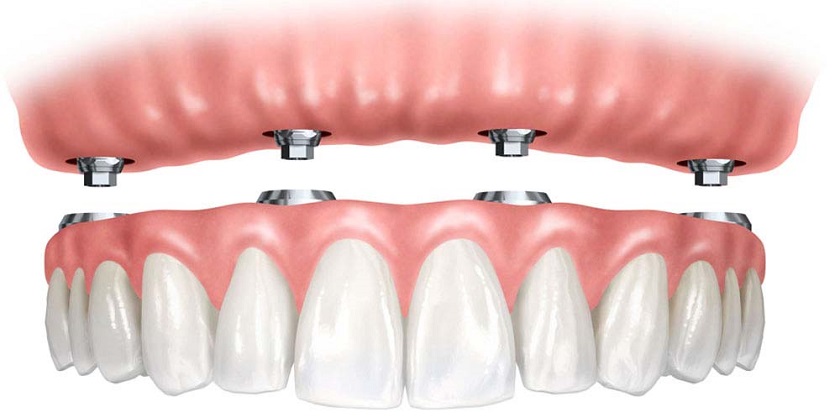- Home
- Implant Retained Dentures

If you lose one or more teeth today, there are many fantastic options available to you, to fill that gap where once a natural tooth existed.
Whether you lose all your teeth in one jaw or both, there are a number of choices, but the most common is the full denture.
A denture is a set of false teeth that rests on the gums, and they have been the go to option for many decades.
However loose dentures are something many wearers are very concerned about and, no matter how good the fit, there can be an underlying concern.
In more recent years the introduction of denture implants has transformed the lives of those wearing full dentures, doing away with the most common denture complaints.
What are dentures/false teeth?
A denture is an artificial replacement for missing teeth and tissues in the mouth.
It is the equivalent to what a prosthetic leg is to someone who has lost a leg.
Because a denture offers a ‘false’ tooth, they are often referred to as false teeth.
You get 2 main types of denture full and partial.
Full dentures replace all the teeth in an arch, whilst a partial replace just a few.
What are denture implants?
Denture implants are man-made components, usually of metal construction, that are surgically inserted into the jawbone of your mouth.
An implant acts like an artificial tooth root and provides an anchoring point to which a denture is attached.
A jaw needs between 2 and 6 strategically placed implants to hold in place the false teeth (denture) that will be attached.
The difference between regular dental implants and denture implants?
The word ‘implant’ is often misused to describe the complete replacement tooth. However, an implant is in fact just the part that is inserted into the jaw bone, to which attachments are made.
A replacement tooth retained by an implant is made up of 3 parts: the implant, an abutment, and a crown.
Some consider implants to be the ‘best’ alternative to your natural teeth.
Theoretically, you could have an implant for each tooth in the jaw, but this would be expensive and unnecessary.
A popular option is dentures that are held in place by implants.
Where implants are being used to hold a denture in place, only 2-6 strategically placed implants per jaw are required. individual crowns were used, many more implants would need to be placed.
Implants themselves come in different sizes, depending on how thick the bone of the jaw is.
Where new teeth are being placed with an implant, abutment, and crown, a standardly sized implant is generally (but not always) used.
The size used depends on the patient. Because the pressures and forces on the jaw bone are different when wearing a it is possible for the smaller mini or midi implants to be used.
These mini and midi implants are better suited to those with less bone density.
With regular implants, an abutment is fitted to an implant, several months after the implant has successfully fused to the jaw bone. When fitting dentures it can be that the abutment is fitted at the same time or that the abutment and implant are all 1 piece.
Denture Implants & dentures are two different things
To be clear, there are essentially 2 parts to those dentures held in place by implants.
You have the implant itself and the dentures.
Confusion can creep in when discussing this topic as the approaches taken for implants for dentures and implants for crowns differ.
The slight exception to the rule is the fixed dentures like ‘All-on-4’ which is essentially a kit which includes all the dentist needs. With “All-on-4″the process of placing the implants is one stage, then fitting the dentures is another.
Benefits of denture implants
There are a number of key benefits to opting for denture implants. The main advantages are as follows.
Security and retention
A good set of full dentures should hold to the natural gums really well, without the need for adhesive and without the wearer being concerned of possible slippage.
However, when natural teeth no longer exist in the gums, the shape and strength of the gums can alter. Often there is a lot less bone in the jaw so that the fit of dentures are often worse and with a higher likelihood of the denture slipping.
Normally, when dentures are used without implants, the bone changes shape and the dentures become loose over about 5-10 years. When this happens the denture should be altered or replaced. This can get expensive.
Denture implants will not move because implants are physically attached to the jaw and the dentures are not held in by suction. This gives the wearer more confidence and happiness as a result because they can go about life without this fear.
Preserve jaw bone and improve the appearance
When the natural teeth have gone from the jaw, the bone essentially shrinks in a process called resorption.
This shrinking can cause changes to the facial appearance, with aging far beyond one’s actual years. Deep wrinkles can form around the mouth and can even cause the smile to turn downwards. It can often pose issues with eating.
For regular denture wearers, this can cause real discomfort and more chances of dentures slipping. Also, the pressure that is transferred to the gums through the denture, can actually speed up the bone loss.
As odd as it sounds having implants halts this bone loss as the implants themselves mimic the natural tooth root you once had so that the body does not break down the bone around the implant.
The body detects the need for bone or not to support teeth, in turn giving strength to the jaw. The body interprets the implants as teeth, stopping the possible issues that would occur if the implants were not placed.
Smaller in the mouth and more natural looking
When retained by an implant, there is the need for less material to the denture to keep it in place.
A traditional denture will have strategically placed material to give the denture the best chance of holding well in place in the mouth.
When implants hold the denture, this excess material can often be removed and allow for a more natural look and fit, making you more confident and less conscious.
Comfort
The implants hold the denture in place rather than natural suction.
The physical presence of the implants help with stopping bone loss and therefore everything fits with more comfort in the mouth for longer.
Normal chewing and more taste
A traditional denture will obstruct some of your natural palates, meaning the taste and texture of food and drink can be obscured, so you do not enjoy the full flavors.
When retained by an implant, a denture does not need to obstruct so much of the palate, meaning taste is barely impeded in the way it can be with a regular denture.
The more secure fit and distribution of forces help with eating and chewing too, to give more balance and strength in the bite.
Confidence & quality of life
Dentures may cause you to fear that everytime you open your mouth your teeth will jump out so that you look awkward, aged or generally unwell. This is going to have a significant knock-on effect to you and the quality of life that you have.
When the implants hold a denture in place you can be assured that the bone is stronger for longer, that your smile will remain, and that the wrinkles will not appear so quickly, as well as eating being more enjoyable.
This peace of mind has a significant knock-on effect to your confidence and approach to life.
With extra confidence comes the desire to live life and enjoy.

